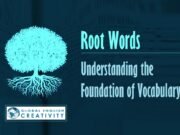Root Words: Understanding the Foundation of Vocabulary
Root words form the fundamental building blocks of many English words. By learning the meanings of root words, one can decipher the meanings of complex vocabulary without consulting a dictionary, as roots often carry intrinsic meanings that hint at the definition of the entire word. This knowledge is especially useful for students, teachers, writers, and language enthusiasts alike.
What Are Root Words?
A root word is the core part of a word from which other words are formed, usually by adding prefixes (at the beginning) or suffixes (at the end). Roots often originate from Latin or Greek and carry specific meanings that help in understanding and constructing vocabulary.
For instance, the root “bio” means “life” in Greek. From this root, we derive words like:
- Biology (the study of life),
- Biography (a written account of someone’s life),
- Biodegradable (capable of being decomposed by living organisms).
Types of Root Words
Roots can be broadly categorized based on their origin:
- Latin Roots – Commonly used in scientific, legal, and formal English.
- Greek Roots – Widely found in scientific and technical vocabulary.
- Anglo-Saxon Roots – Found in basic, everyday English words.
Examples of Common Root Words
Below is a list of popular Latin and Greek roots and some example words derived from each.
| Root | Meaning | Example Words |
| aqua | water | Aquarium, Aquatic, Aqueduct |
| aud | hear | Audio, Audience, Audible |
| bene | good, well | Benefit, Benefactor, Benevolent |
| dict | say, declare | Dictate, Dictionary, Prediction |
| geo | earth | Geography, Geology, Geothermal |
| graph | write | Autograph, Biography, Geography |
| mater | mother | Maternal, Maternity, Matriarch |
| mit/miss | send | Transmit, Mission, Dismiss |
| ped | foot | Pedal, Pedestrian, Centipede |
| phon | sound | Telephone, Symphony, Phonograph |
| port | carry | Transport, Export, Import |
| scrib/script | write | Scribble, Manuscript, Prescription |
| tele | far, distant | Television, Telephone, Telepathy |
| vid/vis | see | Video, Visible, Vision |
Why Study Root Words?
- Enhances Vocabulary – Recognizing roots can help one understand unfamiliar words.
- Improves Spelling and Pronunciation – Knowing root meanings often aids in correct spelling and pronunciation.
- Facilitates Language Learning – Recognizing roots helps in learning other languages with shared Latin or Greek roots.
How to Learn Root Words
- Focus on Common Roots – Start with basic roots frequently found in English.
- Use Flashcards – Create flashcards with roots on one side and definitions with example words on the other.
- Practice in Context – Write sentences using words derived from a particular root to reinforce its meaning.
- Study Related Words Together – Group words with the same root to understand the variations in meaning.
Activities to Master Root Words
- Root Word Quiz – Create a quiz with definitions, asking students to match them with the correct roots.
- Word Formation Game – Challenge yourself to form as many words as possible from a single root word.
- Root Word Tree – Draw a “tree” with roots at the base and different words branching from each.
Conclusion
Understanding root words provides a powerful tool for mastering vocabulary and deepening one’s comprehension of the English language. By learning just a few basic roots, learners can unlock the meanings of hundreds of words, thereby becoming more confident and proficient in their use of English.
also see:
| DOWNLOAD ENGLISH GRAMMAR SMART PDF |
| ONLINE GRAMMAR QUIZZES |
| ENGLISH GRAMMAR_1 |
| ENGLISH GRAMMAR_2 |
| GRAMMAR: SPOT THE ERROR |
| USEFUL EXPRESSIONS IN ENGLISH SPEAKING |
| WORD FORMATION PROCESSES |
| PHONETICS |







































